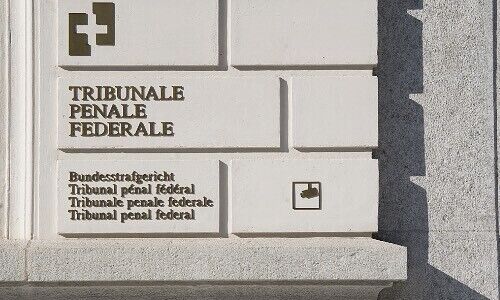A criminal case involving Credit Suisse, a former employer, and Bulgarian drug traffickers has resulted in imprisonments and fines. Credit Suisse will appeal.
A widely followed case that opened in February at the Swiss Federal Criminal Court in Bellinzona, revolving around tons of cocaine, dead bodies, and a gang of former professional wrestlers, Credit Suisse, and an ex-bank employee, among others, has resulted in a guilty verdict for those involved, including the bank, according to a statement from the court (in German).
The former Credit Suisse employee was sentenced to 20 months in prison and a fine for qualified money laundering, with both sentences enforceable.
Claims for Compensation
As to Credit Suisse itself, the court found deficiencies within the bank during the period in question, about the management of customer relations with the criminal gang and the monitoring of the implementation of precautions against money laundering. Based on these internal insufficiencies, the court sentenced Credit Suisse to a fine of 2 million Swiss francs ($2.1 million).
It also ordered the confiscation of assets worth more than 12 million francs held in the criminal organizations' accounts at the bank. Last but not least, the court justified a claim for compensation from the bank of more than 19 million francs.
This amount corresponded to the assets that could not be confiscated due to internal deficiencies at the bank - which had facilitated the money laundering.
Appeal Intended
The main issue for Credit Suisse is that the company itself has been convicted of a criminal offense, and not just some rogue banker, which could have unpredictable consequences, especially for the bank's international business. The bank will want to avoid this at all costs.
Not long after the verdict was issued, Credit Suisse released a statement following the verdict, Credit Suisse noted the decision «for certain historical organizational inadequacies,» and will appeal, saying the investigation dates back more than 14 years.
The bank also said it is «continuously testing its anti-money laundering framework and has been strengthening it over time, in accordance with evolving regulatory standards. Generating compliant business growth in line with legal and regulatory requirements is key for Credit Suisse.»
Landmark Falcon
The ruling against Credit Suisse is not without precedent, although it is only a relatively recent case. Last December, the Federal Criminal Court sentenced Zurich-based Falcon Private Bank, which has since been wound up, to a fine of 3.5 million Swiss francs for organizational shortcomings, the same failings that led to the Credit Suisse verdict.
At fault were inadequate to control mechanisms in the money laundering and corruption case surrounding the Malaysian sovereign wealth fund 1MDB. The ex-Falcon boss Eduardo Leemann was charged, but acquitted of the qualified money laundering charge in Bellinzona.


























